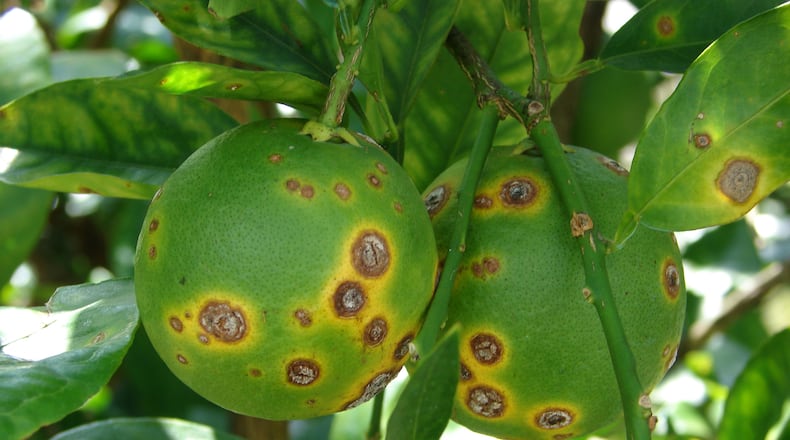The state Department of Agriculture is warning citrus growers about a bacteria detected in a commercial grove in South Georgia that can affect the appearance of fruit.
A federal lab confirmed that citrus canker, a germ that is not harmful to humans or animals, has been found in a sample collected from a Decatur County farm. Citrus canker can cause the premature dropping of leaves and fruit on citrus trees, according to the U.S. Department of Agriculture.
Fruit from infected trees is safe to eat, the USDA says, though citrus canker can affect its “marketability.”
The bacteria causes lesions on the leaves, stems and fruit of infected trees. The lesions tend to be raised and brown in appearance with a yellow halo, according to the USDA. Older lesions can have a “corky” appearance.
“Citrus canker is not harmful to humans, pets, or other animals but it is another disease our growers need to be on the lookout for,” state Agriculture Commissioner Gary W. Black said in a news release. “We want our citrus growers to be aware, so their produce (retains) marketability as fresh fruit.”
Citrus is a growing industry in South Georgia as a warming climate and improved farming techniques have made varieties of the warm weather-loving fruits viable in parts of the Peach State. Roughly 85% of the citrus grown in Georgia are satsumas, but farmers are also experimenting with grapefruit and developing new varieties that are less vulnerable to freezing temperatures.
State and federal officials will survey the area near where citrus canker was detected to assess the extent of the disease’s establishment.
State officials say backyard and commercial growers who suspect trees might be infected with citrus canker should contact their area University of Georgia Extension agent or the state agriculture department’s Plant Protection Office at 404-586-1140 to submit a sample for testing.
-Staff writer Drew Kann contributed to this report.
About the Author
Keep Reading
The Latest
Featured


